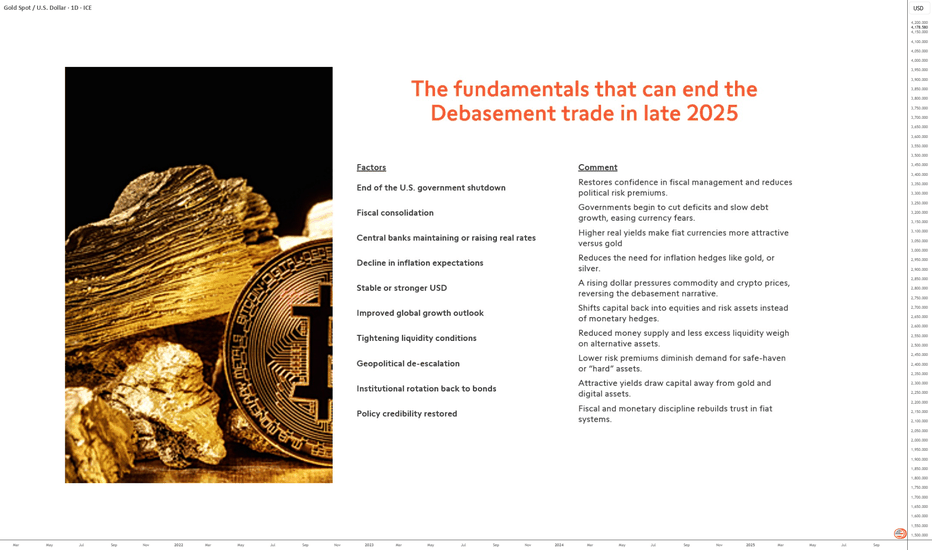14.10.2025 tarihinde sembol PAXG hakkında Teknik Swissquote analizi
Swissquote
پایان بازی "تضعیف پول": چرا طلا و نقره جذابیت خود را از دست میدهند؟

The “debasement trade” has emerged as one of the key market themes: a strategy based on the loss of value of fiat currencies amid unlimited monetary creation, rising public debt, and the erosion of purchasing power. In this context, investors have turned to so-called “tangible” assets—gold and silver—viewed as safe havens against monetary dilution. But while this narrative has dominated much of the year, several fundamentals could gradually bring it to an end by late 2025. First, the end of the U.S. government shutdown would restore confidence in American fiscal management and reduce the political risk premium. In the same vein, clearer fiscal consolidation and a return to minimum budget discipline could signal that governments are regaining control over the trajectory of deficits and debt. This mere shift in perception could be enough to ease fears of U.S. dollar “debasement.” At the same time, if central banks maintain or raise real interest rates, fiat currencies would regain competitiveness against non-productive assets. Positive real yields restore the value of cash and reduce the appeal of inflation hedges. This is even more true if inflation expectations decline: less fear of price surges means less need to seek protection through gold or other precious metals. A stable or stronger dollar would reinforce this dynamic—it is, in fact, the most important factor signaling the end of the debasement trade. Historically, a firm greenback weighs on precious metals while signaling renewed confidence in monetary stability. At the same time, a better global growth environment could redirect capital toward risk assets at the expense of “hard assets.” Another key element is the tightening of liquidity conditions. Less money in circulation and less speculative excess would dry up flows into safe-haven assets. Similarly, a geopolitical de-escalation would reduce demand for protective values. If, in parallel, institutions reallocate toward bonds—attracted by once again appealing yields—that would mark the end of the great flight from the fiat system. Finally, the real turning point will come with the return of political and monetary credibility. When markets once again perceive authorities as capable of managing debt, inflation, and growth without resorting to the printing press, the engine of the debasement trade will naturally shut down. Once confidence is restored, the risk premium on tangible assets will decline, placing the dollar, real yields, and macroeconomic discipline back at the center of the game. DISCLAIMER: This content is intended for individuals who are familiar with financial markets and instruments and is for information purposes only. The presented idea (including market commentary, market data and observations) is not a work product of any research department of Swissquote or its affiliates. This material is intended to highlight market action and does not constitute investment, legal or tax advice. If you are a retail investor or lack experience in trading complex financial products, it is advisable to seek professional advice from licensed advisor before making any financial decisions. This content is not intended to manipulate the market or encourage any specific financial behavior. Swissquote makes no representation or warranty as to the quality, completeness, accuracy, comprehensiveness or non-infringement of such content. The views expressed are those of the consultant and are provided for educational purposes only. Any information provided relating to a product or market should not be construed as recommending an investment strategy or transaction. Past performance is not a guarantee of future results. Swissquote and its employees and representatives shall in no event be held liable for any damages or losses arising directly or indirectly from decisions made on the basis of this content. The use of any third-party brands or trademarks is for information only and does not imply endorsement by Swissquote, or that the trademark owner has authorised Swissquote to promote its products or services. Swissquote is the marketing brand for the activities of Swissquote Bank Ltd (Switzerland) regulated by FINMA, Swissquote Capital Markets Limited regulated by CySEC (Cyprus), Swissquote Bank Europe SA (Luxembourg) regulated by the CSSF, Swissquote Ltd (UK) regulated by the FCA, Swissquote Financial Services (Malta) Ltd regulated by the Malta Financial Services Authority, Swissquote MEA Ltd. (UAE) regulated by the Dubai Financial Services Authority, Swissquote Pte Ltd (Singapore) regulated by the Monetary Authority of Singapore, Swissquote Asia Limited (Hong Kong) licensed by the Hong Kong Securities and Futures Commission (SFC) and Swissquote South Africa (Pty) Ltd supervised by the FSCA. Products and services of Swissquote are only intended for those permitted to receive them under local law. All investments carry a degree of risk. The risk of loss in trading or holding financial instruments can be substantial. The value of financial instruments, including but not limited to stocks, bonds, cryptocurrencies, and other assets, can fluctuate both upwards and downwards. There is a significant risk of financial loss when buying, selling, holding, staking, or investing in these instruments. SQBE makes no recommendations regarding any specific investment, transaction, or the use of any particular investment strategy. CFDs are complex instruments and come with a high risk of losing money rapidly due to leverage. The vast majority of retail client accounts suffer capital losses when trading in CFDs. You should consider whether you understand how CFDs work and whether you can afford to take the high risk of losing your money. Digital Assets are unregulated in most countries and consumer protection rules may not apply. As highly volatile speculative investments, Digital Assets are not suitable for investors without a high-risk tolerance. Make sure you understand each Digital Asset before you trade. Cryptocurrencies are not considered legal tender in some jurisdictions and are subject to regulatory uncertainties. The use of Internet-based systems can involve high risks, including, but not limited to, fraud, cyber-attacks, network and communication failures, as well as identity theft and phishing attacks related to crypto-assets.